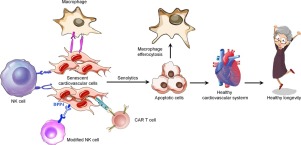Ageing Research Reviews ( IF 12.5 ) Pub Date : 2020-04-13 , DOI: 10.1016/j.arr.2020.101072 Ping Song 1 , Qiang Zhao 1 , Ming-Hui Zou 1

|
Cardiovascular disease (CVD) is the most common disease to increase as life expectancy increases. Most high-profile pharmacological treatments for age-related CVD have led to inefficacious results, implying that novel approaches to treating these pathologies are needed. Emerging data have demonstrated that senescent cardiovascular cells, which are characterized by irreversible cell cycle arrest and a distinct senescence-associated secretory phenotype, accumulate in aged or diseased cardiovascular systems, suggesting that they may impair cardiovascular function. This review discusses the evidence implicating senescent cells in cardiovascular ageing, the onset and progression of CVD, and the molecular mechanisms underlying cardiovascular cell senescence. We also review eradication of senescent cardiovascular cells by small-molecule-drug–mediated apoptosis and immune cell-mediated efferocytosis and toxicity as promising and precisely targeted therapeutics for CVD prevention and treatment.
中文翻译:

靶向衰老细胞以减缓心血管疾病的进展。
心血管疾病 (CVD) 是随着预期寿命增加而增加的最常见疾病。大多数与年龄相关的心血管疾病备受瞩目的药物治疗都导致了无效的结果,这意味着需要新的方法来治疗这些疾病。新兴数据表明,以不可逆的细胞周期停滞和明显的衰老相关分泌表型为特征的衰老心血管细胞在衰老或患病的心血管系统中积累,这表明它们可能会损害心血管功能。这篇综述讨论了衰老细胞与心血管衰老有关的证据,心血管疾病的发生和进展,以及心血管细胞衰老的分子机制。











































 京公网安备 11010802027423号
京公网安备 11010802027423号